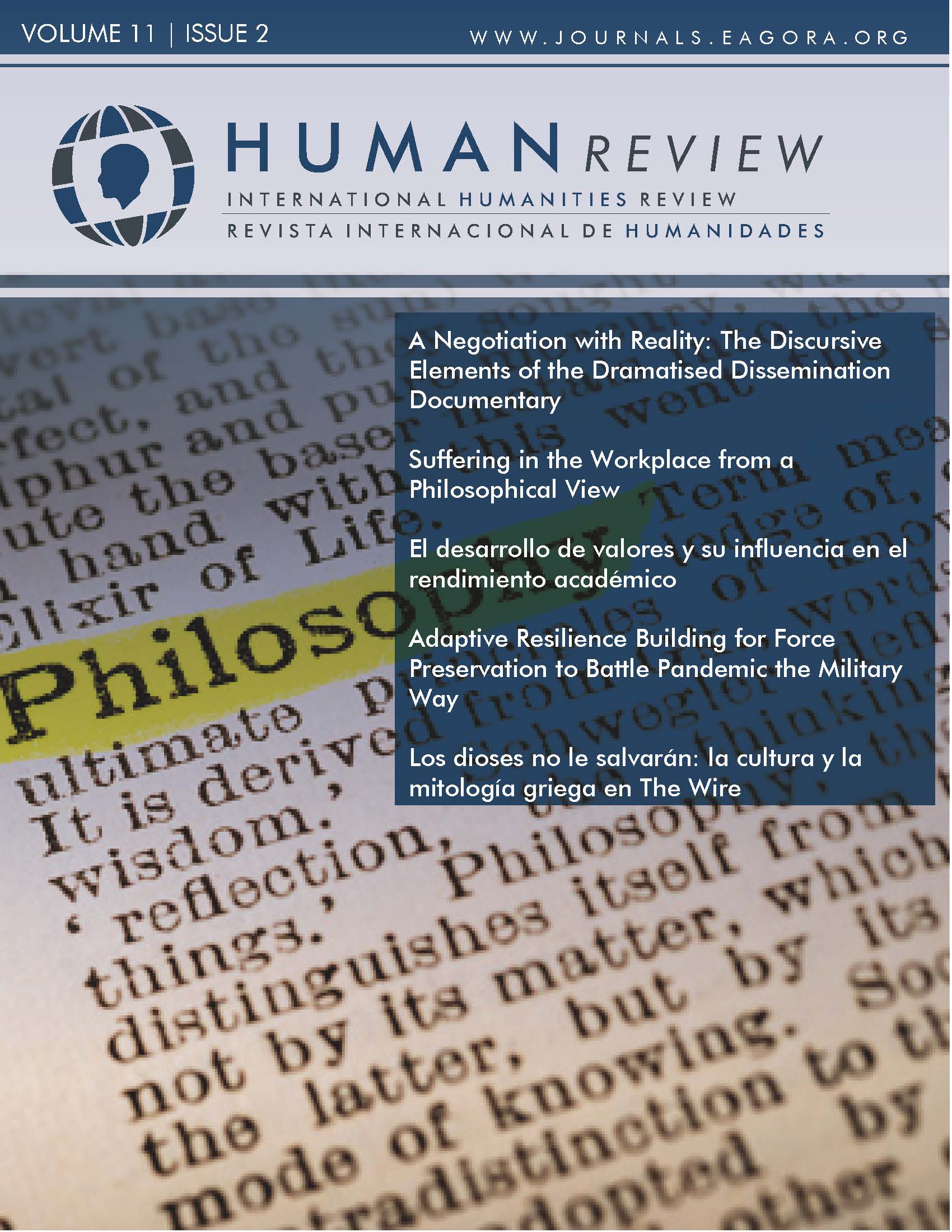Mentes contra Máquinas
Revisión histórica y lógico-filosófica del argumento gödeliano de Lucas-Penrose
DOI:
https://doi.org/10.37467/revhuman.v11.4503Palabras clave:
Teorema de Gödel, Inteligencia artificial, Mecanicismo, Libre albedrío, Filosofía de la mente, ConscienciaResumen
Este artículo presenta, desde una perspectiva histórica y lógico-filosófica, los argumentos gödelianos de dos investigadores oxonienses, John Lucas y Roger Penrose. Ambos se han basado en el Teorema de Gödel para refutar el mecanicismo, el computacionalismo y la posibilidad de crear una IA capaz de simular o duplicar la mente humana. En las conclusiones, se menciona la creciente aplicación de métodos empíricos en las matemáticas y se especula con una posible vía que daría apoyo a los argumentos de Lucas y Penrose.
Citas
Benacerraf, P. (1967). God, the Devil and Gödel. The Monist, 51(1), 9-32. https://doi.org/10.5840/monist196751112.
Brentano, F. (1874). Psychologie vom empirischen Standpunkt. Duncke & Humblot, Leipzig. [Traducido parcialmente al español: Psicología, Schapire, Buenos Aires, 1946]
Chalmers, D. J. (1995). Minds, machines and mathematics. A review of Shadows of the Mind by Roger Penrose. PSYCHE, 2(9), June 1995.
Chalmers, D. J. (1999). La mente consciente. En busca de una teoría fundamental. Gedisa, Barcelona.
Dennett, D. C. (1988). When Philosophers Encounter Artificial Intelligence. Daedalus, 117(1), 283-295. https://www.jstor.org/stable/20025148.
Echeverría, J. (1996). Empirical Methods in Mathematics. A Case-Study: Goldbach's Conjecture. In: Munévar, G. (eds), Spanish Studies in the Philosophy of Science (pp. 19-55). Boston Studies in the Philosophy of Science, 186. Springer. https://doi.org/10.1007/978-94-009-0305-0_2.
Echeverría, J. (en prensa, previsto para 2023). Tecnomatemáticas experimentales y sociedad: von Neumann y Wolfram. Estudios Filosóficos, 72.
George, F. H. (1962). Minds, machines and Gödel: another reply to Mr Lucas. Philosophy, 37(139), 62-63. https://doi.org/10.1017/S0031819100030898.
Gödel, K. (1931). Über formal unentscheidbare Sätze der Principia Mathematica und verwandter Systeme, I. Monatshefte für Mathematik und Physik, 38, 173-198. https://doi.org/10.1007/BF01700692.
Gómez, C. (2003). Significado y libertad. Un ensayo en Filosofía del Lenguaje. Siglo XXI, Madrid.
Good, I. J. (1967). Human and machine logic. The British Journal for the Philosophy of Science, 18(2), 144-147. https://doi.org/10.1093/bjps/18.2.144.
Good, I. J. (1969). Gödel’s theorem is a red herring. The British Journal for the Philosophy of Science, 19(4), 357-358. https://doi.org/10.1093/bjps/19.4.357.
Graubard, S. R. (Ed.) (1999). El nuevo debate sobre la inteligencia artificial: sistemas simbólicos y redes neuronales. Gedisa, Barcelona.
Heisenberg, W. (1972). Diálogos sobre la física atómica. La Editorial Católica.
Hofstadter, D. R. (1992). Gödel, Escher, Bach: un Eterno y Grácil Bucle. Tusquets.
Lewis, D. (1969). Lucas against mechanism. Philosophy, 44(169), 231-233. https://doi.org/10.1017/S0031819100024591.
Lucas, J. R. (1961). Minds, Machines and Gödel. Philosophy, 36(137), 112-127, https://doi.org/10.1017/S0031819100057983.
Lucas, J. R. (1968a). Human and machine logic: a rejoinder. British Journal for the Philosophy of Science, 19(2), 155-156. https://doi.org/10.1093/bjps/19.2.155.
Lucas, J. R. (1968b). Satan stultified: a rejoinder to Paul Benacerraf. The Monist, 52(1), 145-158. https://doi.org/10.5840/monist196852111.
Lucas, J. R. (1970). Mechanism: a rejoinder. Philosophy, 45(172), 149-151. https://doi.org/10.1017/S0031819100009815.
McCullough, D. (1995). Can humans escape Gödel? A review of Shadows of the Mind by Roger Penrose. PSYCHE, 2(4), April 1995.
Moravec, H. (1995). Roger Penrose’s gravitonic brains. A review of Shadows of the Mind by Roger Penrose. PSYCHE, 2(6), May 1995.
Nagel, E. & Newman, J. R. (1958). Gödel’s proof. Routledge, London.
Penrose, R. (1989). The Emperor's New Mind: Concerning Computers, Minds and The Laws of Physics. Oxford University Press. [Traducido al español: La nueva mente del emperador, Grijalbo Mondadori, Barcelona, 1991]
Penrose, R. (1994). Shadows of the Mind: A Search for the Missing Science of Consciousness. Oxford University Press. [Traducido al español: Las sombras de la mente: hacia una comprensión científica de la consciencia, Grijalbo Mondadori, Barcelona, 1996]
Penrose, R. (1996). Beyond the doubting of a shadow: a reply to commentaries on Shadows of the Mind. PSYCHE, 2(23), January 1996.
Penrose, R. (1999). Lo grande, lo pequeño y la mente humana. Cambridge University Press.
Pólya, G. (1965). How to Solve It. Princeton University Press.
Putnam, H. (1988). Much Ado about Not Very Much. Daedalus, 117(1), 269-281. https://www.jstor.org/stable/20025147.
Putnam, H. (1994). Recensión de Shadows of the mind, The New York Times Book Review, 20 de noviembre de 1994, p. 7.
Putnam, H. (1997). Acerca de un mal uso del teorema de Gödel en la especulación sobre la mente. Revista de Libros, 3, marzo 1997, 30-32.
Searle, J. R. (1980). Minds, brains, and programs. Behavioral and Brain Sciences, 3(3), 417-457. https://doi.org/10.1017/S0140525X00005756.
Searle, J. R. (2000). El misterio de la conciencia. Paidós, Barcelona.
Shimony, A. (1999). Sobre mentalidad, mecánica cuántica y la actualización de potencialidades. En: Penrose (1999), 115-125.
Turing, A. (1939). Systems of logic based on ordinals. Proceedings of the London Mathematical Society, 45(1), 161-228. https://doi.org/10.1112/plms/s2-45.1.161.
Whiteley, C. H. (1962). Minds, machines and Gödel: a reply to Mr Lucas. Philosophy, 37(139), 61-62. https://doi.org/10.1017/S0031819100030886.
Descargas
Publicado
Cómo citar
Número
Sección
Licencia
Aquellos autores/as que publiquen con esta revista, aceptan los términos siguientes:
- Los autores/as conservarán los derechos morales sobre la obra y cederán a la revista los derechos comerciales.
- Transcurrido 1 año desde su publicación, la versión del editor pasará a estar en acceso abierto en la web de la editorial, pero la revista mantendrá el copyright de la obra.
- En el caso de que los autores deseen asignar una licencia abierta Creative Commons (CC), podrán solicitarla escribiendo a publishing@eagora.org.








